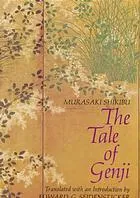The Tale of Genji

Journey into Elegance: Unraveling "The Tale of Genji"
Introduction: A Glimpse into Classic Elegance
Step into the refined world of "The Tale of Genji," a timeless masterpiece authored by Murasaki Shikibu and skillfully translated by Edward G. Seidensticker. This classic Japanese work, often considered the world's first novel, weaves a tapestry of love, politics, and aesthetic beauty.
Personal Prelude: A Whisper of Intrigue
Before we delve into the enchanting narrative of "The Tale of Genji," let me share a personal note. This literary gem came into my life like a whispered secret, and as I turned its pages, I found myself drawn into a world of subtle complexities and profound elegance.
Genji's World: Love and Courtly Intrigues
At the heart of the tale is Hikaru Genji, a nobleman whose life becomes a canvas painted with the hues of love and courtly intricacies. Murasaki Shikibu, a lady-in-waiting at the Heian court, provides readers with a nuanced glimpse into the intricacies of human relationships.
Personal Connection: Echoes of Love's Complexity
As I navigated Genji's world, I couldn't help but draw parallels to the complexities of love in my own life. Shikibu's ability to capture the intricacies of human emotions resonated, offering a reflection of love's timeless dance between joy and sorrow.
Heian Japan's Aesthetic Beauty: Waka Poetry and Ephemeral Moments
One of the captivating aspects of "The Tale of Genji" is its portrayal of Heian Japan's aesthetic beauty. Waka poetry, symbolic imagery, and a profound appreciation for ephemeral moments create a literary landscape where every word is a brushstroke in a masterpiece.
Personal Anecdote: Cherished Moments
Reflecting on the ephemeral, I was reminded of moments in my own life that, like the fleeting beauty in the tale, are cherished for their transience. Shikibu's emphasis on the impermanence of beauty became a gentle nudge to savor life's fleeting treasures.
The Complexity of Characters: Human Flaws and Virtues
Shikibu crafts characters with depth, each bearing a mix of flaws and virtues. Genji himself is a nuanced protagonist whose actions and emotions resonate with the intricacies of the human experience.
Personal Insight: Embracing Imperfections
Contemplating the complexity of characters, I found solace in the imperfections woven into their narratives. Shikibu's characters became mirrors reflecting the beauty found in embracing our own flaws and virtues.
Seidensticker's Translation: Bridging Cultures
Edward G. Seidensticker's translation of "The Tale of Genji" deserves its own spotlight. His mastery in bridging the cultural gap between Heian Japan and modern readers allows us to savor the elegance of Shikibu's prose.
Personal Experience: The Gift of Translation
Considering the gift of translation, I reminisced about the moments when a skilled translator opened doors to literary treasures from distant cultures. Seidensticker's work acted as a bridge, inviting me into a world where cultural nuances and timeless stories coexist.
Conclusion: A Tapestry of Timeless Beauty
In conclusion, "The Tale of Genji" is not just a novel; it's a tapestry woven with threads of love, aesthetic beauty, and the complexities of the human soul. Murasaki Shikibu's narrative, brought to life by Edward G. Seidensticker's translation, invites readers on a journey through the refined corridors of Heian Japan.
In the end, if you're ready to immerse yourself in a world where elegance meets emotion, "The Tale of Genji" beckons—a literary odyssey that transcends time.